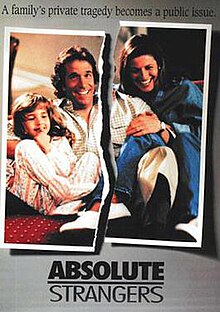Absolute Strangers
| Absolute Strangers | |
|---|---|
 | |
| Genre | Drama |
| Written by | Robert Anderson |
| Directed by | Gilbert Cates |
| Starring | Henry Winkler |
| Music by | Charles Fox |
| Country of origin | United States |
| Original language | English |
| Production | |
| Executive producer | Gilbert Cates |
| Producers | Dennis E. Doty Peggy Griffin (associate producer) |
| Cinematography | Mark Irwin |
| Editor | Millie Moore |
| Running time | 96 min. |
| Production companies | Absolute Strangers Company Gilbert Cates Productions |
| Original release | |
| Network | CBS |
| Release | April 14, 1991 |
Absolute Strangers is a 1991 made-for-television CBS docudrama featuring Happy Days star Henry Winkler returning to his first major TV role in eight years.[1] The screenplay, written by Robert Woodruff Anderson, was based on the true story of a husband's controversial decision to have his wife undergo an abortion to aid her recovery after a head-trauma accident had left her comatose.[2] The title is taken from court decision that used "absolute strangers"—itself apparently derived from a courtroom outburst by the husband—to describe two anti-abortion activists, one of whom sued the husband to get custody of the fetus, the other to be appointed guardian of the comatose wife.[2][3][4]
The impending broadcast of the film spurred anti-abortion activists, including the American Family Association, to try to discourage advertisers from buying time during the show.[1][4][5] These efforts provoked counter-demonstrations,[5] and campaigns of letter-writing in support of the broadcast from Planned Parenthood, the National Council of Jewish Women, and other groups.[6]
The real-life husband, Martin Klein, appeared in a cameo. Henry Winkler played Martin Klein, with his wife Nancy played by Jennifer Hetrick. Others in the cast included Karl Malden as Nancy Klein's father, Patty Duke as the appeals court judge (personally opposed to abortion) in the pivotal court case, and Richard Kiley as a doctor who favors abortion in such cases.[7][8]
The film's director, Gilbert Cates, was nominated for a Primetime Emmy.[9][10]
Cast
- Henry Winkler as Marty Klein
- Patty Duke as Judge Ray
- Richard Kiley as Dr. R.J. Cannon
- Audra Lindley as Anne Zusselman
- Karl Malden as Fred Zusselman
- Jennifer Hetrick as Nancy Klein
- Jayne Atkinson as Eleanor Barcroft
- Doris Belack as Fran
- Vasili Bogazianos as Dr. Sears
- Ron Frazier as Davis
- Steven Gilborn as Dr. Dalton
- Tony Jay as Weisfeld
- James Karen as Dr. X
- Alan Oppenheimer as Stevenson
- René Auberjonois as Quinn
- Mitchell Laurance as Stan
References
- ^ a b Jerry Buck (AP) (April 13, 1991). "Henry Winkler returns to acting". The Free Lance-Star.
- ^ a b Pat Milton (AP) (April 13, 1991). "Real Life Story Sets Up Hard Choices". The Free Lance-Star.
- ^ Michael Hill (April 12, 1991). "Absolute Strangers' is skillful, compelling look at abortion". Baltimore Sun. Retrieved 2011-10-09.
- ^ a b Kathy O`Malley (April 14, 1991). "Winkler`s Latest Role Not The Stuff Of Happy Days". Chicago Times. Retrieved 2011-10-09.
- ^ a b Dennis McDougal (March 13, 1991). "Battle Lines Form Over 'Strangers'". Los Angeles Times. Retrieved 2011-10-09.
- ^ Cynthia L. Cates; Wayne V. McIntosh (2001). Law and the web of society. Hastings Center Studies in Ethics. Georgetown University Press. pp. 187–190. ISBN 0-87840-860-6.
- ^ Greg Dawson (April 14, 1991). "'Strangers' Could Use More Fonz, Less Fred". Orlando Sentinel. Retrieved 2011-08-09.
- ^ Ron Miller (April 11, 1991), "Henry Winkler returns in 'Absolute Strangers", The Day
- ^ "Absolute Strangers". IMDb. Retrieved 2011-10-09.
- ^ "Absolute Strangers". Outstanding directing in a miniseries or a special 1991. Academy of Television Arts & Sciences. Retrieved 2011-10-09.
